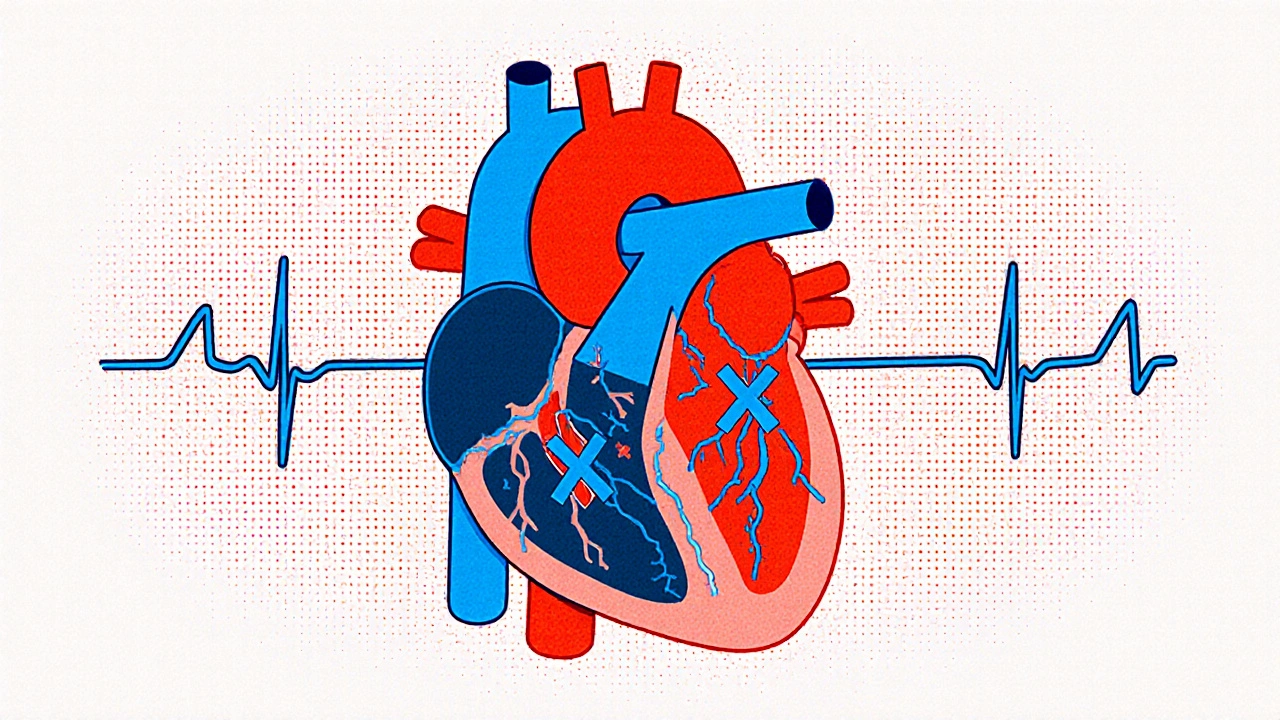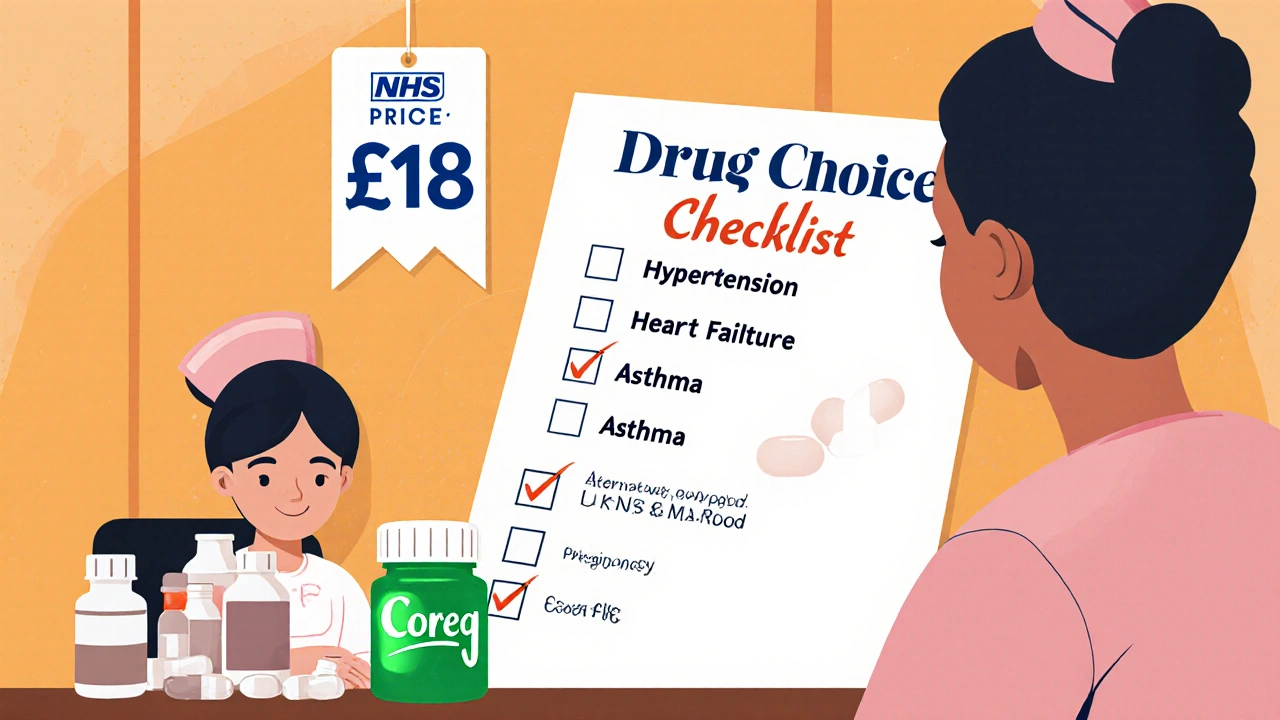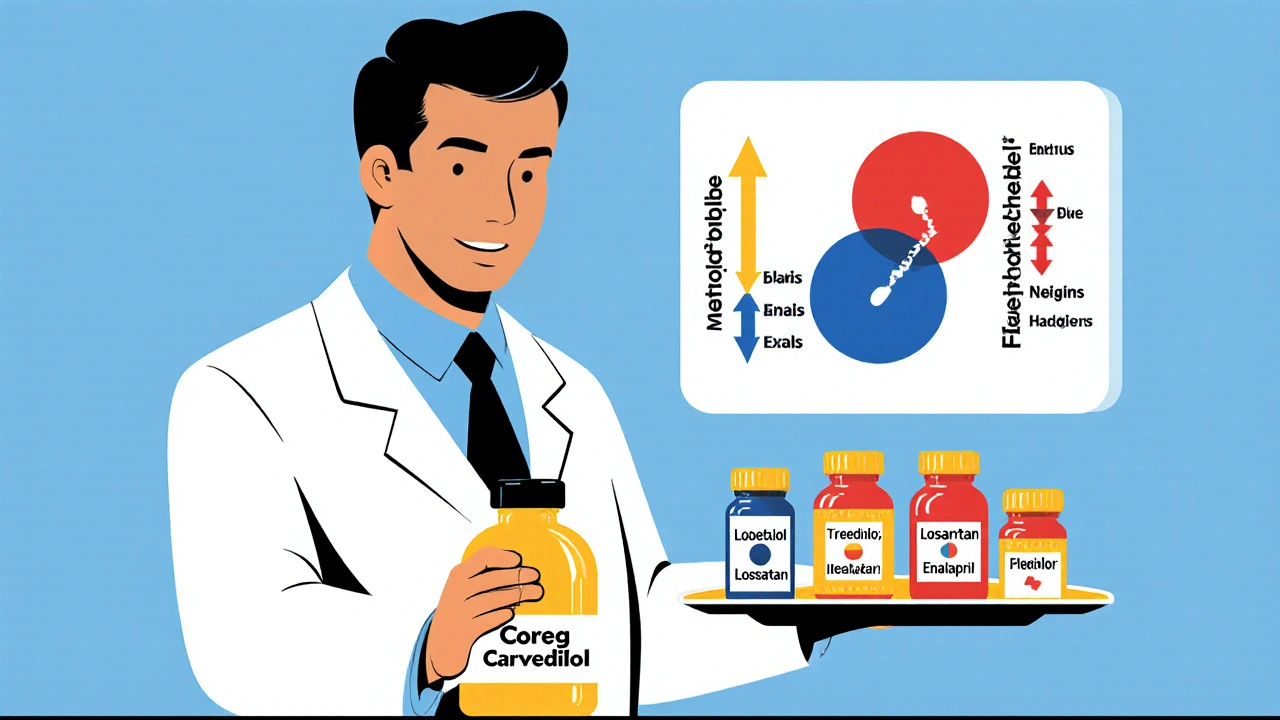Blood Pressure Drug Decision Assistant
1. Primary Condition
2. Comorbidities
3. Side Effect Concerns
Select your medical profile to see personalized recommendations
When doctors prescribe a medicine for high blood pressure or heart failure, they often weigh several options. Carvedilol is a non‑selective beta‑blocker that also blocks alpha‑1 receptors, helping to lower both heart rate and vascular resistance. In the UK, it’s sold under the brand name Coreg and is a go‑to for many patients with hypertension or chronic heart failure.
- Carvedilol offers dual beta‑ and alpha‑blockade, which can improve heart‑failure outcomes.
- Its alternatives include other beta‑blockers, ARBs, ACE inhibitors, and diuretics, each with unique strengths.
- Choosing the right drug depends on comorbidities, side‑effect tolerance, and cost.
- This guide breaks down mechanism, dosing, common side effects, and UK pricing for the most popular alternatives.
How Carvedilol Works and Who It Helps
Carvedilol blocks beta‑1, beta‑2, and alpha‑1 receptors. The beta‑blockade slows the heart, while alpha‑1 blockade dilates blood vessels, reducing after‑load. It’s approved for hypertension, left‑ventricular systolic dysfunction, and after‑myocardial‑infarction therapy. Typical starting dose in the UK is 6.25 mg twice daily, titrated up to 25 mg twice daily for most adults.
Common Alternatives - Quick Snapshot
Below are the main drug families doctors consider when Carvedilol isn’t ideal.
| Drug | Class | Mechanism | Typical Dose (UK) | Main Indications | Common Side Effects | Average Monthly Cost (NHS) |
|---|---|---|---|---|---|---|
| Carvedilol | Beta‑blocker (non‑selective) | Beta‑1/2 + Alpha‑1 blockade | 6.25‑25 mg BID | Hypertension, Heart Failure | Dizziness, Fatigue, Weight gain | £12‑£18 |
| Metoprolol | Beta‑blocker (β1‑selective) | Beta‑1 blockade only | 50‑200 mg daily | Hypertension, Angina, MI | Bradycardia, Cold extremities | £8‑£14 |
| Labetalol | Beta‑blocker (mixed) | Beta‑1/2 + Alpha‑1 blockade (less potent) | 100‑200 mg BID | Hypertensive emergency, Pregnancy | Hypotension, Liver enzymes ↑ | £10‑£16 |
| Atenolol | Beta‑blocker (β1‑selective) | Beta‑1 blockade only | 25‑100 mg daily | Hypertension, Angina | Sleep disturbances, Depression | £6‑£12 |
| Bisoprolol | Beta‑blocker (β1‑selective) | Beta‑1 blockade only | 5‑10 mg daily | Hypertension, Heart Failure | Nasogastric discomfort, Fatigue | £7‑£13 |
| Losartan | Angiotensin II Receptor Blocker (ARB) | Blocks AT1 receptor → vasodilation | 25‑100 mg daily | Hypertension, Diabetic nephropathy | Dizziness, Hyperkalemia | £9‑£15 |
| Hydrochlorothiazide | Thiazide diuretic | Inhibits Na⁺/Cl⁻ reabsorption in DCT | 12.5‑25 mg daily | Hypertension, Edema | Electrolyte loss, Gout flare | £5‑£10 |
| Enalapril | ACE inhibitor | Prevents conversion of Ang I → Ang II | 5‑20 mg daily | Hypertension, Heart Failure | Cough, Hyperkalemia | £8‑£14 |
When Carvedilol Is the Better Choice
If a patient has both hypertension and systolic heart failure, Carvedilol’s double‑blockade can improve survival more than a pure beta‑1 blocker. Trials like the COPERNICUS study showed a 35 % reduction in mortality when patients with severe heart failure were switched to Carvedilol versus placebo. It also helps with post‑MI remodeling, making it a solid first‑line agent for those with multiple cardiac issues.

Scenarios Where Alternatives Shine
Not every patient tolerates Carvedilol. Here are common reasons to reach for another drug:
- Asthma or COPD: The non‑selective beta‑2 blockade can trigger bronchoconstriction. A β1‑selective blocker like Metoprolol or Atenolol reduces that risk.
- Severe liver disease: Carvedilol is extensively metabolised by the liver; dose adjustments can be tricky. Labetalol, which also has hepatic clearance, may not help-an ARB such as Losartan might be safer.
- Pregnancy: Carvedilol lacks robust safety data, whereas Labetalol has a longer track record for gestational hypertension.
- Electrolyte concerns: Diuretics like Hydrochlorothiazide are useful adjuncts when fluid overload is an issue, especially in resistant hypertension.
- ACE‑inhibitor intolerance (cough): Switching to an ARB (Losartan) avoids the cough while still blocking the renin‑angiotensin system.
Cost and Accessibility in the UK
The NHS provides standard pricing for generic versions. Carvedilol’s monthly cost sits around £12‑£18, while many β1‑selective blockers are a few pounds cheaper. ARBs and ACE inhibitors hover in the £8‑£15 range. For patients on a tight budget, combining a low‑dose β‑blocker with a cheap thiazide (Hydrochlorothiazide) can achieve target blood pressure without breaking the bank.

Key Decision Checklist for Clinicians and Patients
- Identify primary condition: hypertension alone vs. heart failure vs. post‑MI.
- Check comorbidities: asthma, liver disease, pregnancy, electrolyte issues.
- Review current medication list for potential drug‑drug interactions (e.g., other CYP2D6 substrates).
- Consider cost and NHS prescription status.
- Start low, titrate slowly, monitor heart rate, blood pressure, and renal function.
- Adjust or switch based on tolerance, side‑effect profile, and therapeutic response.
Frequently Asked Questions
Can I take Carvedilol with a diuretic?
Yes. Combining Carvedilol with a thiazide diuretic like Hydrochlorothiazide is a common strategy to hit both heart‑rate and volume targets. Monitor electrolytes and blood pressure closely during the first weeks.
Why does Carvedilol cause weight gain?
The drug reduces sympathetic tone, which can lead to fluid retention, especially at higher doses. Adding a low‑dose diuretic often mitigates this side effect.
Is Carvedilol safe for people with diabetes?
Generally safe. It does not affect glucose metabolism directly, but its blood‑pressure lowering effect can improve overall cardiovascular risk in diabetics.
What should I do if I miss a dose?
Take the missed tablet as soon as you remember, unless it’s almost time for the next dose. Never double‑dose; that can cause severe bradycardia.
Can Carvedilol be used in children?
Pediatric use is limited and only under specialist supervision. Dosing is weight‑based and typically reserved for severe heart‑failure cases.
Choosing the right cardiovascular medicine is a balance of efficacy, tolerance, and cost. Carvedilol offers a unique double‑blockade that can be a game‑changer for heart‑failure patients, but alternatives like Metoprolol, Losartan, or a simple thiazide may fit better for isolated hypertension or specific comorbidities. Use the checklist above, discuss with your prescriber, and monitor your response closely.

8 Comments
Kala RaniOctober 25, 2025 AT 19:29
Coreg is overrated and the newer ARBs do the job with fewer side effects
Octavia ClaharOctober 30, 2025 AT 09:35
I get why many patients love Coreg for its double‑blockade, but honestly it’s not the magic bullet you think it is. The weight gain and fatigue can really knock people out of the gym, and for someone with asthma it’s practically a no‑go. If you can’t tolerate those side effects, switching to a β1‑selective blocker or an ARB is a much smarter move. Just remember, every drug has trade‑offs – there’s no perfect pill.
Cheyanne MoxleyNovember 4, 2025 AT 00:42
Listen, you can’t just jump on Coreg without thinking about the bigger picture – it’s a huge responsibility to your heart and lungs. Ignoring the asthma warning is basically reckless, and anyone who does that is putting themselves and their family at risk. The fact that you’re even considering a non‑selective blocker when there are safer β1‑selective options shows a lack of basic medical literacy. Stop glorifying “double‑blockade” and start respecting your body’s limits. If you’re truly caring about your health, you’ll read the fine print and choose wisely.
Kevin StrattonNovember 8, 2025 AT 15:49
Medicine is a dialogue between the body and the chemistry we introduce – Coreg is just one voice in that conversation :) It reminds us that treating hypertension isn’t merely about numbers, but about balancing forces, like a yin‑yang of beta and alpha blockade. Yet, every choice carries a ripple; the side‑effects are the echo of that balance. So, reflect on what you truly need, and let the prescription be a mindful extension of your health journey.
Megan DicocheaNovember 13, 2025 AT 06:55
I appreciate the thorough breakdown of carvedilol versus the other agents. The table makes it easy to compare costs and side effects. It’s clear that for patients with both hypertension and heart failure, the dual blockade can be advantageous. At the same time, the article wisely points out the concerns for asthma and liver disease. Keeping an eye on individual tolerance is essential.
Jennie SmithNovember 17, 2025 AT 22:02
Wow, this guide is a kaleidoscope of info – bright, detailed, and super useful! If you’re wrestling with blood pressure meds, think of it like picking the right paint for a masterpiece – carvedilol adds depth, while losartan brings a smooth finish. Dive into the checklist, experiment wisely, and paint your heart health with confidence. You’ve got this!
Anurag RanjanNovember 22, 2025 AT 13:09
Coreg works well for combined hypertension and heart failure but watch for bronchospasm in asthma. For pure hypertension consider metoprolol or an ARB like losartan. Adding a low‑dose thiazide can help control volume without big cost. Monitor BP, heart rate and renal function regularly.
James DoyleNovember 27, 2025 AT 04:15
When evaluating carvedilol against the pharmacologic armamentarium for cardiovascular risk mitigation, one must first invoke the principle of receptor pharmacodynamics. The non‑selective beta‑1/β‑2 plus alpha‑1 antagonism confers a synergistic decrement in systemic vascular resistance while simultaneously attenuating chronotropic drive. Such a mechanistic profile is particularly advantageous in the setting of systolic dysfunction where after‑load reduction translates to improved ejection fraction. Conversely, the beta‑2 blockade component precipitates bronchoconstriction, thereby rendering carvedilol suboptimal for patients with reactive airway disease. From a pharmacokinetic standpoint, carvedilol undergoes extensive first‑pass metabolism via CYP2D6 and CYP2C9, yielding active metabolites with half‑lives that may prolong beta‑blockade effects. Clinical trial data, notably the COPERNICUS and BEST studies, have substantiated a mortality benefit in severe heart failure cohorts, highlighting a relative risk reduction upwards of 30 % compared with placebo. Nevertheless, the adverse event spectrum, including dose‑dependent fatigue, orthostatic hypotension, and weight gain secondary to fluid retention, mandates vigilant titration protocols. In patients harboring comorbidities such as chronic kidney disease, the adjunctive use of a thiazide diuretic must be calibrated to avoid exacerbating electrolyte disturbances. Economic considerations further complicate therapeutic decision‑making; while the NHS pricing for generic carvedilol hovers around £12–£18 per month, beta‑1 selective agents like metoprolol are marginally cheaper, and ARBs such as losartan occupy a comparable cost tier. Importantly, guideline algorithms from ESC and NICE place carvedilol as a Class I recommendation for chronic heart failure with reduced ejection fraction, yet they assign a lower recommendation strength for isolated hypertension without heart failure. Thus, in a patient whose primary indication is hypertension alone, a β1‑selective blocker or an ACE inhibitor may achieve target blood pressure with a more favorable side‑effect profile. The therapeutic hierarchy also acknowledges the role of combination therapy, wherein low‑dose carvedilol paired with a thiazide can synergistically address both heart rate and volume overload. From a safety monitoring perspective, serial assessment of heart rate, blood pressure, renal function, and serum potassium is indispensable to preempt iatrogenic complications. Moreover, clinicians should remain cognizant of potential drug‑drug interactions, particularly with other CYP2D6 substrates such as antidepressants, which may amplify bradycardic effects. Patient education is a non‑negotiable adjunct; individuals must be instructed on the ramifications of missed doses and the hazards of abrupt discontinuation, which can precipitate rebound tachycardia. In sum, carvedilol stands as a potent, double‑edged sword whose optimal deployment hinges on a nuanced appraisal of cardiovascular pathology, comorbid conditions, pharmacogenomics, and cost constraints.